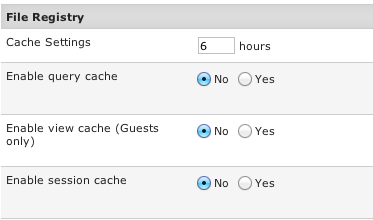Difference between revisions of "Configuration-Cache tab"
From JReviews Documentation
| (One intermediate revision by one other user not shown) | |||
| Line 1: | Line 1: | ||
| − | |||
| − | |||
| − | |||
| + | [[File:conf-cache.png]] | ||
| − | + | '''Cache Settings''' - cached files will be re-created if they have expired. | |
| + | '''Enable query cache''' | ||
| − | + | * The cache is cleared after the duration time has passed or every time the JReviews setup, configuration, and a listing or review is submitted or updated. This setting, when enabled, caches the data returned from the database for both guests and registered users. It reduces the number of queries per page for lists and detail pages, which have some of the most intensive queries. | |
| − | + | * '''Notes:''' The cached queries will take up disk space because all returned data is stored. If disk space is an issue, monitor it and it might make sense to leave it disabled. It's a trade-off between database queries and disk storage. To get improved results for registered users, query cache should be used in combination with a view cache solution where view cache is typically disabled in both JReviews and Joomla. | |
| − | + | ||
| − | + | ||
| − | + | ||
| + | '''Enable view cache (Guests only)''' | ||
| − | + | * Caches whole views for guest users only. The cache is cleared after the cache duration time has ended or every time the JReviews setup, configuration, and a listing or review is submitted or updated. | |
| − | + | * '''Notes:''' This setting is similar to the Joomla Cache. The JReviews view cache is only for guests viewing the output of the JReviews component, not the entire site. If you are using the Joomla Cache or a 3rd Party Cache, it may be best to turn off this cache. | |
| − | + | ||
| + | '''Enable session cache''' | ||
| − | *'''Notes on JReviews Cache Optimization in General:''' | + | * Caches data to the user's session to reduce the number of queries. For example the total count of results for different paginated pages is cached and then read from the user's session data. |
| − | + | ||
| − | + | '''Notes on JReviews Cache Optimization in General:''' | |
| + | |||
| + | If you enable debug mode in Joomla you can check the number of queries and memory used in the different pages, and that gives you a reference for what happens when you enable/disable some of these settings. When using another extension to compress JS or CSS files you may have to exclude some of the JReviews scripts from the optimization. After optimizing your sites be sure to check all functionality as a guest. | ||
| Line 27: | Line 26: | ||
[[Category:JReviews]] | [[Category:JReviews]] | ||
[[Category:Settings]] | [[Category:Settings]] | ||
| − | |||
Latest revision as of 14:43, 1 December 2019
Cache Settings - cached files will be re-created if they have expired.
Enable query cache
- The cache is cleared after the duration time has passed or every time the JReviews setup, configuration, and a listing or review is submitted or updated. This setting, when enabled, caches the data returned from the database for both guests and registered users. It reduces the number of queries per page for lists and detail pages, which have some of the most intensive queries.
- Notes: The cached queries will take up disk space because all returned data is stored. If disk space is an issue, monitor it and it might make sense to leave it disabled. It's a trade-off between database queries and disk storage. To get improved results for registered users, query cache should be used in combination with a view cache solution where view cache is typically disabled in both JReviews and Joomla.
Enable view cache (Guests only)
- Caches whole views for guest users only. The cache is cleared after the cache duration time has ended or every time the JReviews setup, configuration, and a listing or review is submitted or updated.
- Notes: This setting is similar to the Joomla Cache. The JReviews view cache is only for guests viewing the output of the JReviews component, not the entire site. If you are using the Joomla Cache or a 3rd Party Cache, it may be best to turn off this cache.
Enable session cache
- Caches data to the user's session to reduce the number of queries. For example the total count of results for different paginated pages is cached and then read from the user's session data.
Notes on JReviews Cache Optimization in General:
If you enable debug mode in Joomla you can check the number of queries and memory used in the different pages, and that gives you a reference for what happens when you enable/disable some of these settings. When using another extension to compress JS or CSS files you may have to exclude some of the JReviews scripts from the optimization. After optimizing your sites be sure to check all functionality as a guest.
